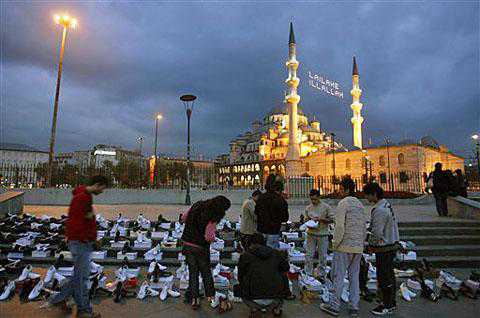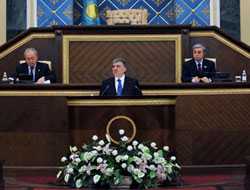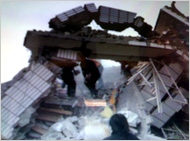|
||||||||
Category: Central Asia
-

Uzbeks Targeted in South Kyrgyzstan
-

Turkey’s President opens Embassy, Culture Center in Kazakhstan
 Turkey’s President Abdullah Gul inaugurated Turkey’s Embassy and a Turkish Culture Center in the Kazakh capital Astana on Wednesday.
Turkey’s President Abdullah Gul inaugurated Turkey’s Embassy and a Turkish Culture Center in the Kazakh capital Astana on Wednesday.Delivering a speech in the inauguration ceremony, Gul said, “we are very happy because we are opening the new building of the Turkish embassy.”
Gul recalled that Turkey was the first country that recognized the independence of Kazakhstan.
Later Gul and Kazakhstan’s President Nursultan Nazarbayev visited the International Exhibition of Arms and Military-Technical Equipment KADEX-2010 in Astana.
President Gul also met with Kazakh and Turkish businessmen over a luncheon.
Yunus Emre Culture Center, named after a 13th century Turkish poet and Sufi mystic, has become the fifth culture center opened abroad. Yunus Emre Foundation had earlier opened centers in Sarajevo, Tirana, Cairo and Skopje. The foundation plans to open new culture centers in Cologne, London, Moscow, Paris and Damascus this year.
President Gul also said that Yunus Emre Culture Center aims to keep Turkish language and culture alive, and also to spread it.
He said that Turkish culture prevailed in the Balkans and Central Asia, adding that these culture centers would help those who want to learn Turkish.
Following the inauguration ceremony, Gul also visited a Turkish-Kazakh high school in Astana.Later, Gul departed from Kazakhstan to return home.
AA
-

Hundreds Dead in Earthquake in Northwest China
By ANDREW JACOBS
BEIJING — A powerful earthquake in northwest China killed at least 300 people, injured 8,000 and left many others buried under debris on Wednesday, Chinese state media reported.
Enlarge This Image
Zhang Hongshuan/Xinhua, via Reuters
A photo taken by a mobile phone showed destroyed houses after an earthquake hit the Tibetan Autonomous Prefecture of Yushu, northwest China’s Qinghai province on Wednesday.

The New York Times
Enlarge This Image
Zhang Hongshuan/Associated Press
Rubble from destroyed houses fills the streets.
Enlarge This Image
Zhang Hongshuan/Associated Press
People gathered in open areas after the quake hit.
The quake, which struck at 7:49 a.m. in Qinghai Province, had a magnitude of 7.1 according to China’s earthquake administration.
According to the China Earthquake Networks Center, the earthquake struck in Yushu County, a remote and mountainous area sparsely populated by farmers and herders, most of them ethnic Tibetans. The region is pocked with copper, tin and coal mines and rich in natural gas. A government Web site said the county’s population was around 80,000.
China National Radio said that more than 80 percent of the homes in the area had collapsed but that schools and government buildings had largely remained standing.
Karsum Nyima, an employee of a local television station in Yushu, told the national television broadcaster, CCTV, that the quake had sent people running into the streets.
“All of a sudden, the houses collapsed,” he said. “It was a terrible earthquake. In the park, a Buddhist pagoda fell down. Everyone is in the street in front of their houses. They are trying to find family members.”
In the same broadcast, Wu Yong, an officer in the Chinese Army, said that the road to the airport was impassable and that soldiers were digging out people from collapsed homes by hand.
“The most important thing now is that this place is far from everything, with few accessible rescue troops available,” Mr. Wu said. “I feel like the number of dead and injured will keep going up.”
Local officials said that phone service was limited and that rescue efforts were stymied by a lack of heavy equipment. Medical supplies and tents, they added, were in short supply.
State news media reported that 700 paramilitary officers were already working in the quake zone and that another 3,000 troops would be sent to the area to assist in search and rescue efforts. The civil affairs ministry said it would also send 5,000 tents and 50,000 blankets.
Last August, Golmud was hit by a 6.2 magnitude earthquake that destroyed dozens of homes but caused no deaths. Qinghai is an ethnic melting pot of Tibetans, Mongols and Han Chinese. It is adjacent to Sichuan Province, where at least 87,000 people died in a powerful earthquake in 2008.
Xiyun Yang contributed research.
-

Debate on Caspian Sea and future of Nabucco gas pipeline project
Nabucco gas pipeline, which emerged in the recent history of energy, can create new opportunities for the EU countries to check the monopoly of Russia over their gas supply. This project is not only important for the diversification of gas supplies of the EU countries, but also will bring new advantages and stakes to the different countries while passing them through. Some of these countries are the post-Soviet Azerbaijan, Turkmenistan and Kazakhstan that intend to provide the natural gas resources for the following project. As obvious, these gas providers are the littoral Caspian Sea countries that legally dispute over the demarcation of the mentioned sea. Will it create difficulties for the realization of the Nabucco project? Or intentions of these states to join Nabucco will ease the dispute and push them towards concessions?
KEY WORDS: Nabucco gas pipeline, the Caspian Sea, demarcation, legal status, International Court of Arbitration, Azerbaijan, Turkmenistan, Kazakhstan, the EU
Introduction
The Nabucco gas pipeline is one of the hot issues among the planned projects those are on the agenda. The main problem that has been discussing till today is the natural gas sources of the following project. The first planned gas will come from Caspian Sea sources where the legal status of the sea is not solved completely yet. For that reason, all the issue of Caspian Sea legal status which related with the Nabucco project will analyze in this research paper. In the first part will analyze potential resources of the project and their opportunity in order to join the Nabucco pipeline. In this perspective there mainly will investigate Caspian Sea resources. Then in the second part will focus on the unresolved legal status of the Caspian Sea and its negotiation process. At the result of the negotiation there were signed the agreement between Caspian littoral states which also will analyze in second part. Later, in the third part will investigate sectoral dispute between two costal states of Caspian Sea –Azerbaijan and Turkmenistan around the same oil and gas fields in the sea border of the two countries. Moreover, Ashgabat decide to send the issue to International Court of Arbitration which it can influence the realization of the Nabucco gas pipeline project. On the other hand, there are also will examine the intentions of Baku and Ashgabat toward the Nabucco project.
The thesis of this paper is that the realizing of Nabucco project mainly depends on the Central Asian gas resources. To active this project, Trans-Caspian pipeline must not be forgotten. Since, there is a strong relationship between these two lines. Nevertheless, Azerbaijan, Turkmenistan and Kazakhstan could not be realized it due to possible Russian influence. Thus, they need at least one of the Western countries or US guarantee to realize it. Because of the construction of these pipelines can influence to Russian gas monopoly all over the Europe. However, problem is that today EU counters could not construct a union energy policy which they try to make it individually with Russia or others.
In order to analyze every part of the issue, firstly it was used traditional method in which historical development is based on. Additionally, there were online resources which including official statements, and other reliable academic papers.
Potential resources and problem overview of Nabucco project
The Nabucco project represents a new gas pipeline connecting the Caspian region, Central Asia, Middle East via Turkey, Bulgaria, Romania, Hungary with Austria and further on with the Central and Western European gas markets[1]. In order to realize the project, the Caspian Sea gas resources are very essential, as the first stage of the project gas will come from Azerbaijan, which there is only Azerbaijan gas guarantee until now. Moreover, staying of the instability in the Middle East decreases the opportunity of this region in order to join the project and increases the importance of the Caspian Sea resources. On the other hand, for connecting the Iraq gas to Nabucco gas pipeline there is a need for a new pipeline between Turkey and Iraq which is a part of the Arab Gas pipeline. Besides, Iran is one of the alternative gas providers to Nabucco project with its enormous reserves but there is a problem about its underdevelopment gas infrastructure that needs huge investment. Also, the US is against the participation of Iran in the Nabucco project until solving the nuclear problems in this country. Because of all these reasons the Caspian Sea reserves are fundamental for realizing this project.
Despite of the expectations of the European Union, there is a problem of the legal status of the Caspian Sea, which from 1991 till today could not be solved by the littoral states in this region. There is another problem as well. The Trans-Caspian pipeline that is planned to transport Turkmen and Kazakh gas to Baku has not been constructed yet, which will be joined Nabucco gas pipeline. Additionally, on July 2009 increasing dispute between Azerbaijan and Turkmenistan around the Caspian Sea oil and gas fields, where Turkmenistan has decided to send the issue to International Arbitrage, could create another difficulty for realization of the Nabucco project. This dispute stems from the unresolved legal status of the Caspian Sea that will be discussed bellow.
The unresolved legal status of the Caspian Sea
The Caspian region is one of the main energy bases and one of the major economic assets in the world. There are huge oil and gas reserves here, which are currently attempted to be fully improved and be transported to the world markets. Its oil reserves estimated to be 18-35 billion barrels that near to the United States (22 billion) and the North Sea (17 billion barrels) oil reserves.[2] Additionally, the region has a huge capacity of gas reserves as well, which is approximately 236-337 trillion cubic feet[3].
After the establishment of the USSR, the legal status of the Caspian Sea is defined by the agreement between the Soviet Russia and Iran (Persia) without participation of the other Caspian littoral states. This agreement was signed between these two states on 26 February 1921. Another agreement on Trade and Navigation between the USSR and Iran was signed on 25 March 1940[4]. Later, in 1949, the Soviet Union began to use the Caspian Sea hydrocarbon resources in the offshore area centered in the costal part of the Caspian Sea of Azerbaijan. It is worthwhile to mention that before the exploration in the fields of Siberia of the USSR in 1960s, the most productive region was Azerbaijan in the Soviet Union[5].On the other hand, until 1970, the USSR part of the Caspian Sea was used as a common sea among Azerbaijan, Kazakhstan, Russia and Turkmenistan. After that in 1970 according to the new amendment, this area was divided among the Soviet littoral states[6]. According to this amendment, Kazakhstan got 29%, Azerbaijan 20%, Russia 19%, Turkmenistan 18% and Iran 14% of the Caspian Sea[7].
After the collapse of the Soviet Union in 1991, when the Caspian Sea littoral states got their independence, they intended to determine the new status of Caspian Sea. In this period every littoral state’s perspective was different from others and they couldn’t achieve an agreement. Because, this process took place without pre-planning and, obviously, the littoral states were not ready for that in 1991-1992. From the beginning, Azerbaijan was an only state that proposed the sectoral division via the median line method of the Caspian Sea, which now is accepted by the all other littoral states of the Caspian Sea but only except Iran.[8]
Despite of the disagreement between the coastal states, Azerbaijan signed the “Contract of Century” in 1994 with the largest oil companies in the world in order to corporate and explore the Caspian Sea off shore fields in the Azerbaijan sector. With this event, the Caspian Sea became one of the major geo-strategic areas and energy sources of the world. However, in this period the Caspian Sea was not a part of the economic plans of Iran and Tehran considered the fact of the occurrence of the western oil companies in the Caspian Basin as a political danger to its national security. Moreover, Russia also could not accept this agreement because of the old imperialistic ambitions in the South Caucasus[9].
After, singeing of the “Contract of Century” the Caspian littoral states could make an agreement and it was the first phase of the negotiations period. Russia and Kazakhstan could come to the agreement on the division of the northern part of the Caspian Sea to realize sovereign rights on subsoil use from July 6, 1998[10]. Later than, Azerbaijan also joined the contract, where at the beginning of the negations process her propose was the same. The signing of this agreement was very important, because the Caspian Sea costal states found a solution to the main legal problem of the Caspian Sea about its status and ways of the using it. The basin’s sectional division was admitted by all littoral states, except Iran. Additionally, this agreement put a quota on the fishery and bioresearches in the Caspian Sea because of the threat of extinction[11].
With the signing of the agreement, a dispute occurred between Azerbaijan and Turkmenistan because of the distribution of the Caspian three oil and gas fields – Kapaz (Turkmenistan calls it Serdar), Azeri (Omar) and Chirag (Osman). Even, in 2001 the Embassy of Turkmenistan to Azerbaijan was closed. Nevertheless, the relationship of two states began to normalize in the time of new and current President of Turkmenistan, Gurbanguly Berdimuhamedow, and there were signed some good intention documents[12]. Then, bilateral negotiations constantly started between the two sides in order to solve the problem in the sea borders of the two states.
The bases of the bilateral negotiations have been constructed in the middle line principle and it was taken as a basis, which is also accepted in the international practice. The middle line concludes from the last costal point of territory of Azerbaijan and Turkmenistan. However, the problem is that, Ashgabat suggests that “Absheron peninsula and Chilov Island should not be taken into consideration while delimitating the Caspian Sea between Turkmenistan and Azerbaijan.[13]” If the two states border are delimitated from the Absheron peninsula and Chilov Island, there are two oil and gas fields – Azeri (Omar) and Chirag (Osman), which should be included into Azerbaijani territory of the Caspian Sea. Conversely, if these territories should not be taken into consideration while delimitating the Caspian Sea borders between these two states, these two oil and gas fields will be included into Turkmenistan area of the Caspian Sea.
Despite of these expectations of Ashgabat, there is no any international practice like this, which one territory should not be taken into consideration while delimitating the sea borders between two or more states. Besides, Absheron peninsula is not a small territory in the Caspian Sea that can be ignored while measurement. It lies down nearly 60 km towards the Caspian Sea, in which approximately 1/3 population of Azerbaijan lives. Additionally, the capital city of Azerbaijan is placed at the same area[14].
Moreover, there is another dispute around the field of Kapaz (Turkmenistan calls it Serdar), where, according to Ashgabat, belonged to Turkmenistan sector of the Caspian Sea during the Soviet period. However, according to Baku- after the 1970 amendment in the USSR’s Caspian Sea law, the border line passed through from the center of Kapaz (Serdar) field. Furthermore, this filed is revealed by Azerbaijani oilman in the Soviet time and today Baku wants to extract it from Turkmenistan.
The International Court of Arbitration and the intentions of Baku and Ashgabat
On the other hand, the bilateral negotiations has been continuing from 1999 till today between two parts and last meeting was realized in Baku on July 15-17 2009. After the last meeting, President of Turkmenistan, Gurbanguly Berdimuhamedow ordered to address the international experts and high-degree lawyers to learn the Azerbaijan’s claims over the disputed fields in the Caspian Sea and legality of the foreign oil-gas companies operating in those fields, and then, intent to send the documents to the International Court of Arbitration. It should be also mentioned that before this statement, in the meeting of governments on July 10, Berdimuhamedow stressed that they (Turkmenistan) want to participate in Nabucco project[15], where there is seemed a contradiction between his two statements. Because, sending the dispute issue to an international court can cause a problem for realization of Nabucco project[16] from the point of view prestige. Since, may be an investments would not want to put investment to the project which its source in the International court.
Nevertheless, Ashgabat decide to send issue to the International Arbitration may be there is different intention of Berdimuhamedow. Because, Turkmenistan is one of the largest global reserves and it is the largest producer of gas in the region with production of 2.0 tcf/yr, it accounts for almost two-thirds gas output of the region[17]. When Berdimuhamedow came to power, one of his priorities in the foreign policy was the diversification of energy transport roots to the world market. There is an attractive opportunity- is the Nabucco project, which completely depends on Turkmen gas to be realized at the end, because, Azerbaijani gas is not enough to fulfill the Nabucco gas pipeline.
There is one of the main obstacles for Ashgabat to join Nabucco project is the unconstructed Trans-Caspian gas pipeline that aims to transfer Turkmen gas to Baku. Moreover, Turkmenistan and Azerbaijan could not realize it together, because there are needs the Western encouragements to the both sides[18]. One can assume that the unexpected Turkmen move at this time aimed “specifically at attaining some more concessions from the West, especially given the current huge interest of the latter to get the Nabucco project swiftly implemented”[19].
Meanwhile, there is a similarity between Azerbaijan and Turkmenistan in energy transportation policy toward the Nabucco project. It is a very important project for these two countries, because, both sides want to transport energy reserves to the world market without the bypassing Russia. Despite of those two Caspian littoral states’ intentions to this project, there is European Union diminished policy to realize the Nabucco project. As every EU country has its own national energy policy, as a result, they cannot construct a common and harmonized EU energy policy. At the result of inattention of EU, Baku singed the gas agreement with Gasport for selling Shah- Deniz II field’s gas to Russia .The amount of gas agreement was not huge, just 500 mil but it was the signal of Baku to the EU for to be more active.
On the other hand, four months ago, there was an explosion in the natural gas pipeline between Turkmenistan and Russia, where the natural gas flow has failed to resume yet[20]. Besides, as a result of the global financial crisis, there is a decrease in the natural gas demand in Europe. Thus, Russia wants to re-negotiate the volume-and-dollar terms for its gas. However, Turkmen has protested that a contract is a contract and Turkmenistan is losing $1 billion in a month in revenue[21].
Meanwhile, the unbearable Russian position to Turkmen gas export still is in progress. In addition, there is imperceptible European Union view to Nabucco project which both of them speed up the construction of China Turkmenistan gas pipeline. The pipeline 1,833-kilometer gas pipeline starts at the gas plant near this border town in Turkmenistan and runs through central Uzbekistan and southern Kazakhstan before entering China at the border pass of Horgos in the northwest region of Xinjiang. The pipeline, starting near a Chinese-developed gas field in eastern Turkmenistan, is expected to reach full annual capacity of 40 billion cubic metres by 2012-13 and help Beijing propel its explosive economic growth[22].
Then again, the both of Turkmenistan and Azerbaijan want to create a center of attention of the United State’s interest to this gas pipeline project. Because, the Nabucco project is the one of the big project in the world that there need full politically and financially supporting for the supplier counters and European counters. It’s too hard for European Union countries to realize the Nabucco project without the US supporting. Moreover, the “Nabucco is an integral part of a US strategy of total energy control over both the EU and all Eurasia”[23]. On the other hand, the role of the US lobbying for successfully realizing of the Baku-Tbilisi-Ceyhan oil pipeline which it began from Azerbaijan to Turkey’s Mediterranean coast, which opened in 2005[24] also be a magnet for Turkmenistan and Azerbaijan.
Eventually, the legal status of the sea should solve according to International Law and International practices with the providing of costal states interests because, the Caspian Sea is one of the major geo-strategic areas and energy sources of the world but not only for littoral states. On the other hand, Azerbaijan and Turkmenistan should compromise each other in order to realizing of the Nabucco project because the both states are interest with this project.
Conclusion
The potential resources of the Nabucco project are under the question. There are some problems in the Middle East also Caspian Sea as well which it can influence the realization of project. On the other hand, there is unresolved legal status of the Caspian Sea that it began after the collapse of the Soviet Union until today. Moreover, at the result of negotiation process there was signed the agreement between Caspian Sea littoral states about the sartorial division of sea according to middle line principle. Nevertheless, signed agreement for sartorial division of Caspian Sea, there is no fully solution of the problem. Additionally, increasing dispute between Azerbaijan and Turkmenistan around the Caspian Sea oil and gas fields, where Turkmenistan has decided to send the issue to International Arbitrage, could create another difficulty for realization of the Nabucco project.
[1] Nabucco Gas Pipeline International GmbH, “Project Description ,Pipeline Route,” (accessed August 15,2009)[2]CaspEcoProject Management and Coordination Unit, Caspian Sea Environment Program “General background” http://www.caspianenvironment.org/NewSite/Caspian-Background.htm / (accessed 27 August 2009)
[3] Bernard A. Gelb, Terry Rayno Twyman, The Caspian Sea Region and energy resources (New York: Hauppauge, 2004)
[4] Kepbanov A. Yolbar,” The New Legal Status of the Caspian Sea Is The Basis of Regional Co-Operation and Stability ,” Journal of International Affairs, Vol.2 Num. 4 (December 1997-February 1998)
[5] Kamyar Mehdiyoun” International Law and the Dispute Over Ownership of Oil and Gas Resources in Caspian Sea” The American Society of International Law. (2000)
[6] Kepbanov A ..” The New Legal Status of the Caspian Sea …”
[7] Meftun Metin”HAZAR Politik ve Bölgesel Güç”( İstanbul: IQ kültür sanat yayıncılıq 2004) 148
[8] Yusifzade B. Khoshbakht, “The Status of the Caspian Sea Dividing Natural Resources between Five Countries,” Azerbaijan International, vol.8:3 (2000) (accessed September 10, 2009).
[9] Rustam Mamedov “International Legal Status of the Caspian Sea: Issues of Theory and Practice” (working paper, Ankara University journals database, 32 DOI: 10.1501/Intrel_0000000041,2001)
[10] Kazakhstan Today, “Russia ratified Russian-Kazakhstan Caspian sea division agreement” March 11.2007, (accessed September 19, 2009).
[11] Mamedov “International Legal Status of the Caspian Sea…
[12] Michael P. Croissant, Bülent Aras, “Oil and geopolitics in the Caspian Sea Region” ( Peaeger Publisher, Westport USA, 1999) 34.
[13] APA , “Turkmenistan Foreign Ministry: Absheron peninsula and Chilov island should not be taken into consideration while delimitating the Caspian Sea” August 04, 2009 (accessed September 20, 2009)
[14] Gennadiĭ Illarionovich Chufrin , The security of the Caspian Sea Region ,( Stockholm International Peace Research Institute OXFORD 2001) 64
[15] APA , “Turkmenistan Foreign Ministry: Absheron peninsula and Chilov island….
[16] Jackson Alexander, “The Implications of the Turkmenistan-Azerbaijan Dispute”, Caucasian Review of International Affairs, vol. 42, August 10, 2009 (accessed September 19.2009)
[17] Hooman Peimani , The Caspian pipeline dilemma: political games and economic losses, (Peaeger Publisher, Westport USA, 2001) 15
[18] Ibrahimov Rovshen, “Turkmenistan need Western encouragement”( Qafqaz University lessons Baku, Azerbaijan August 27,/2009 )
[19] Jackson “The Implications of the Turkmenistan…..
[20] David Trilling” Turkmenistan: Pipeline Spat With The Kremlin Turns Into A Political Test Of Strength” EURASIA INSIGHT 4/15/09 (accessed Dismember 25, 2009).
[21]Steve Le Vine “Nabucco and Trans-Caspian: Times Change, Pipeline Politics Goes On” JULY 30, 2009, (accessed September 23, 2009).
[22] Xinhua reports “Chinese, Turkmen, Kazakh, Uzbek presidents unveil gas pipeline”
[23]Hearing, Energy supplies in Eurasia and implications for U.S. energy security (Washington USA: DIANE Publishing, 2007) 60
[24] Brenda Shaffer, Energy Politics (Pennsylvania USA: University of Pen… Press, 2009) 53
Famil QURBANOV – Baku Qafqaz University
-

Exiled Activist Says Uyghur Issue Crucial For Central Asia
 Rebiya Kadeer, president of the World Uyghur CongressDecember 09, 2009PRAGUE/VIENNA — World Uyghur Congress President Rebiya Kadeer has told RFE/RL she is urging European politicians to focus on the fate of Uyghurs in China’s Xinjiang Province who continue to be persecuted and jailed, RFE/RL’s Kyrgyz Service reports.
Rebiya Kadeer, president of the World Uyghur CongressDecember 09, 2009PRAGUE/VIENNA — World Uyghur Congress President Rebiya Kadeer has told RFE/RL she is urging European politicians to focus on the fate of Uyghurs in China’s Xinjiang Province who continue to be persecuted and jailed, RFE/RL’s Kyrgyz Service reports.Kadeer told RFE/RL by phone from Vienna that thousands of Uyghurs have been arrested, sentenced, and jailed in Xinjiang since interethnic clashes in July in the region’s capital, Urumchi, when at least 197 people were killed.
“[The Europeans] understand our problems very well — all the [European] politicians I met with said they would put Uyghur issues on their agenda,” Kadeer said. “Peace for Uyghurs means peace in Central Asia and peace in the world. And politicians in European governments, parliaments, and EU institutions said that’s why they think it’s important to put Uyghur problems on their agenda.”
Kadeer, who was imprisoned by Beijing for five years before being released in 2005, is meeting with government officials and human rights activists on a tour of European capitals that includes Rome, Berlin, Vienna, Stockholm, Brussels, and Paris.
She said that she is unable to travel to Central Asian countries because those governments are afraid of angering China with her visit.
Kadeer, 62, told RFE/RL that the Uyghurs — who are considered the province’s indigenous people — are currently trying to leave China for other countries in order to avoid persecution, which has worsened since the riots.
Kadeer stressed that the issue of the Uyghurs in China is important for neighboring Central Asian countries, a message she is bringing to European officials.
Xinjiang, which means “New Frontier” in Mandarin Chinese, is called East Turkestan by Uyghurs after the republic that was established on the territory of Xinjiang in 1933 and 1944.
In both cases the republic was dissolved and the territory was annexed by China.
Uyghurs are a Muslim, Turkic-speaking ethnic group.
Hundreds of thousands of Uyghurs live in Central Asia’s post-Soviet republics.
https://www.rferl.org/a/Exiled_Activist_Says_Uyghur_Issue_Crucial_For_Central_Asia/1899753.html


